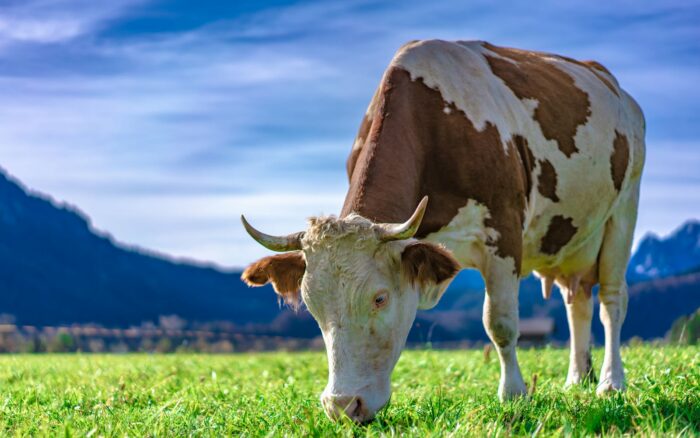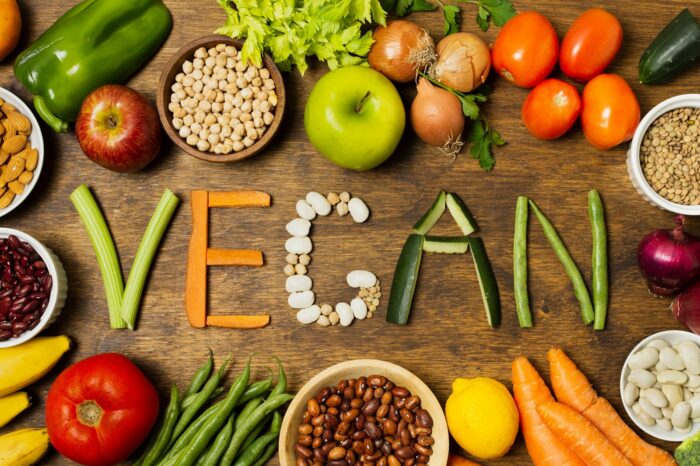How to Go Vegan
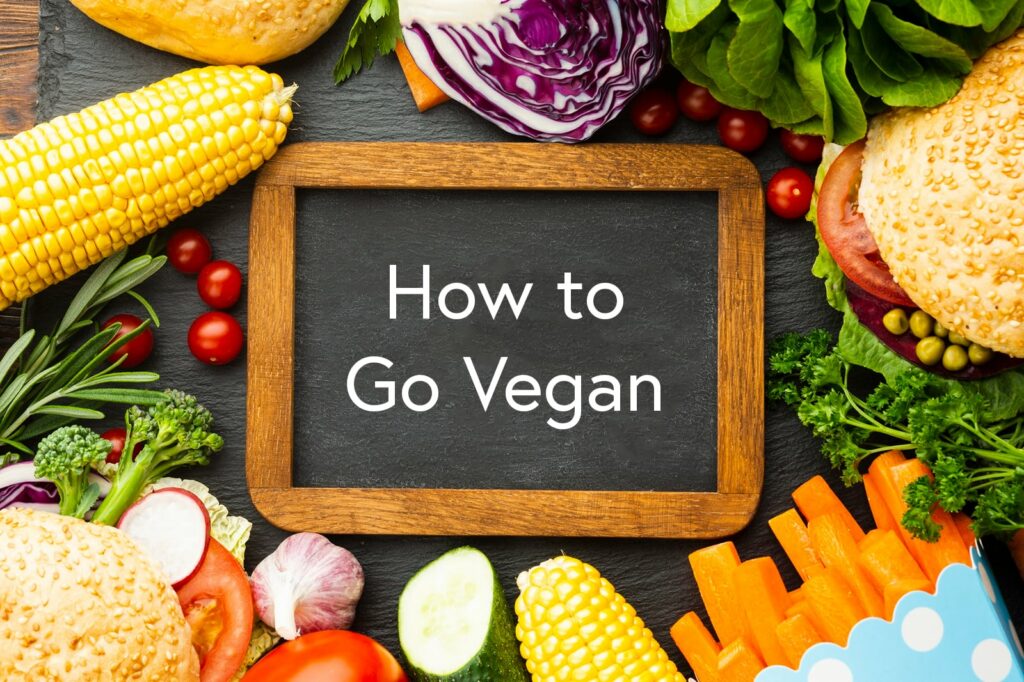
You might be thinking of going vegan and you’re wondering how to go vegan and transition into a plant-based diet.
Navigating this lifestyle change may feel overwhelming at first, but worry not – with the right guidance and strategies, you can smoothly shift into a plant-based way of living.
From mastering the art of vegan meal planning to exploring delicious plant-based substitutes, there are essential steps you can take to make this journey not only manageable but also enjoyable.
Let’s explore some essential tips and strategies to help you embrace vegan living confidently and purposefully.
Start with a Vegan Challenge (Vegan Trial Period)
If you’re considering transitioning to a vegan lifestyle, a great way to start is by taking on a vegan challenge. This involves committing to a specific period, such as a week or a month, where you adhere to a strict vegan diet. This is a great first step on how to start being vegan. During this time, you’ll eliminate all animal products from your meals, including meat, dairy, eggs, and honey. By immersing yourself in this experience, you can firsthand experience the benefits of plant-based eating and gain insight into the impact of your food choices.
Participating in a vegan challenge can serve as a stepping stone towards adopting a long-term vegan diet. Many individuals find these challenges to be motivating, providing them with support and a glimpse of the advantages associated with embracing a plant-based lifestyle. You can also explore organized programs or online communities that offer valuable guidance and encouragement throughout your vegan trial period. These resources can connect you with like-minded individuals and provide access to helpful tools to facilitate a smoother and more enjoyable transition.
As a vegan dietitian, I can attest to the numerous benefits of embarking on a vegan challenge. It allows you to explore new foods, experiment with plant-based recipes, and discover the wealth of nutrients present in a vegan diet. Moreover, engaging in a vegan challenge can help you develop a greater awareness of animal welfare and environmental sustainability, aligning your food choices with your values.
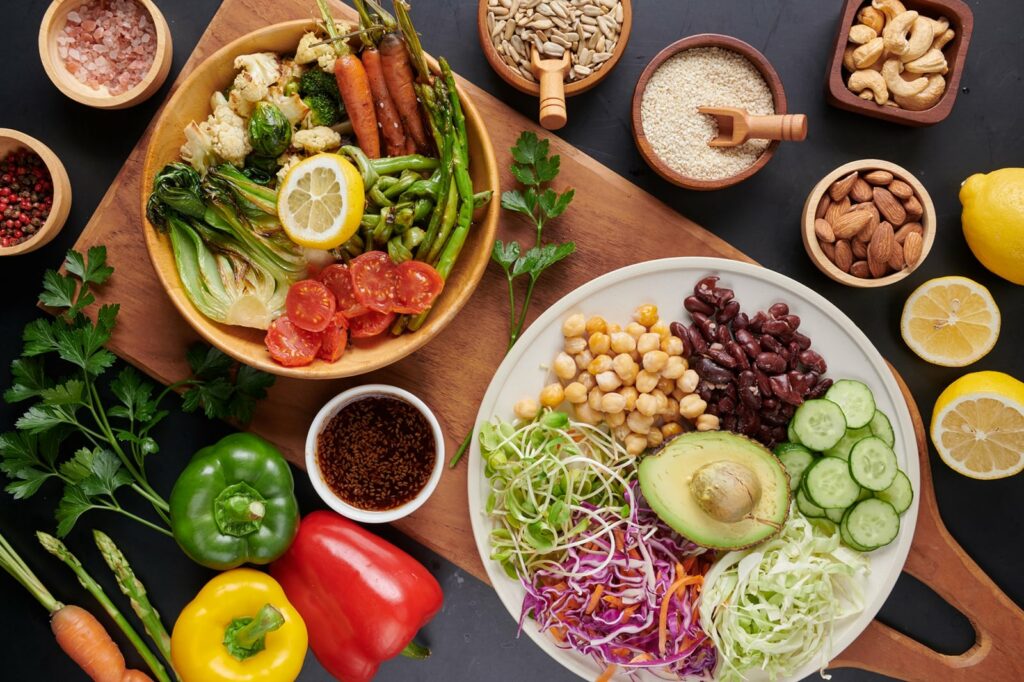
Gradually Transition to a Vegan Diet
As you’re becoming vegan and transitioning to a vegan diet, it’s important to make gradual changes to your meals by incorporating more plant-based options. Start by replacing one or two animal-based meals with delicious plant-based alternatives to explore a variety of flavors and options. Try out vegan substitutes for meat, dairy, and eggs to discover tasty replacements that suit your preferences.
To ensure you’re receiving a wide range of nutrients, focus on increasing your intake of fruits, vegetables, whole grains, legumes, nuts, and seeds. These foods are rich in essential vitamins, minerals, and antioxidants that support overall health. Experimenting with different recipes from vegan cookbooks, online resources, and support groups can make your transition smoother and more enjoyable.
During this transition phase, it’s crucial to pay attention to key nutrients like vitamin B12, iron, calcium, and omega-3 fatty acids. These nutrients are important for your well-being and can be obtained from plant-based sources or supplements. By gradually adjusting your eating habits and exploring a diverse range of plant-based foods, you can create a balanced vegan diet that meets your nutritional needs.
Seeking guidance from a vegan dietitian or nutritionist can also provide personalized recommendations and support as you make the switch to a vegan lifestyle. Remember, transitioning to a vegan diet is a journey, so be patient with yourself and celebrate each step you take towards a more sustainable and compassionate way of eating.
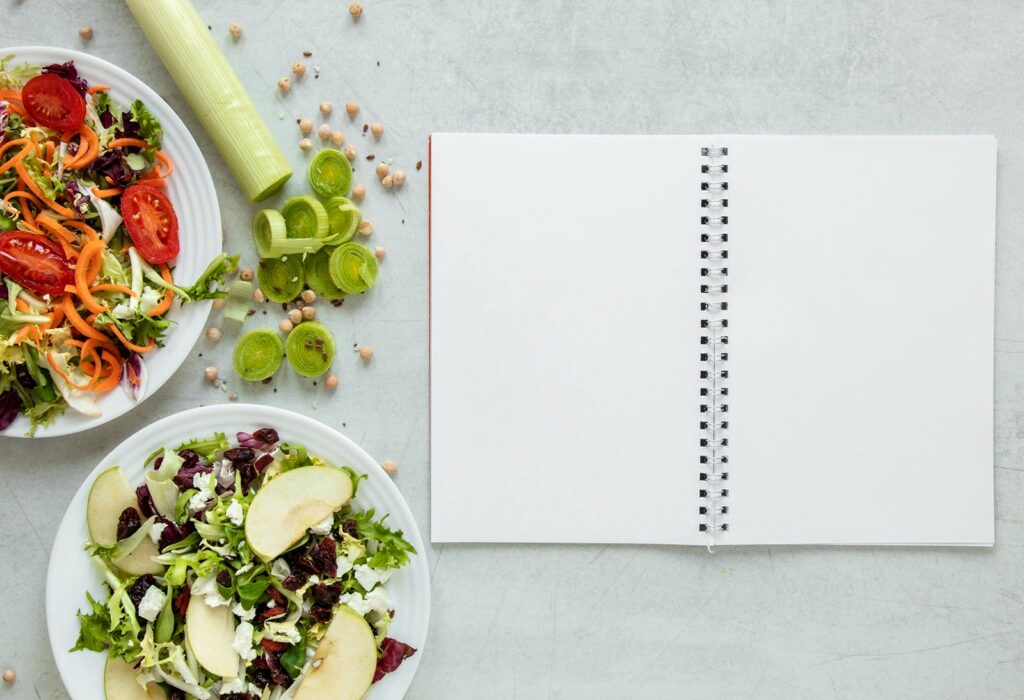
Meal Plan for a Vegan Diet
Designing a well-balanced vegan meal involves incorporating a diverse range of plant-based foods such as fruits, vegetables, whole grains, legumes, nuts, and seeds to ensure you receive essential nutrients in your diet. Plant-based diets provide a plethora of options for creating a nutritious eating plan. It’s important to include plant-based protein sources like tofu, tempeh, lentils, and chickpeas to maintain a balanced vegan diet. Consider incorporating fortified foods or supplements to ensure you’re getting essential nutrients like vitamin B12, iron, and omega-3 fatty acids for overall health support.
To keep your meals interesting, explore different cooking techniques and flavor combinations. Having a collection of favorite vegan recipes can simplify your transition to a vegan lifestyle and assist you in establishing a healthy eating routine. By embracing the diversity and nutritional richness of plant-based foods, you can enjoy a delicious and well-rounded vegan diet that nourishes your body effectively.
Stock Up on Vegan Diet Essentials
Stocking up on vegan diet essentials is crucial for how to start going vegan and for maintaining a balanced and nutritious plant-based diet. By filling your pantry and fridge with a variety of plant-based staples, you can ensure you have everything you need to create delicious and healthy meals.
Start by incorporating a colorful array of fruits and vegetables into your diet. These vibrant foods provide a wide range of vitamins, minerals, and antioxidants that are essential for overall health. Opt for a variety of options to ensure you’re getting a diverse mix of nutrients.
In addition to fruits and vegetables, include whole grains like quinoa, brown rice, and oats in your pantry. These grains are rich in fiber and complex carbohydrates, providing sustained energy throughout the day. They also offer a variety of essential nutrients that support overall well-being.
Legumes are another important component of a vegan diet. Chickpeas, lentils, and black beans are excellent sources of plant-based protein, which is crucial for muscle strength and repair. Incorporating legumes into your meals can help ensure you’re getting an adequate amount of protein on a vegan diet.
Don’t forget about nuts and seeds, such as almonds, chia seeds, and flaxseeds. These nutrient-dense foods are rich in healthy fats, vitamins, and minerals, making them a valuable addition to any vegan pantry. They can be used in a variety of recipes to add texture, flavor, and nutritional benefits.
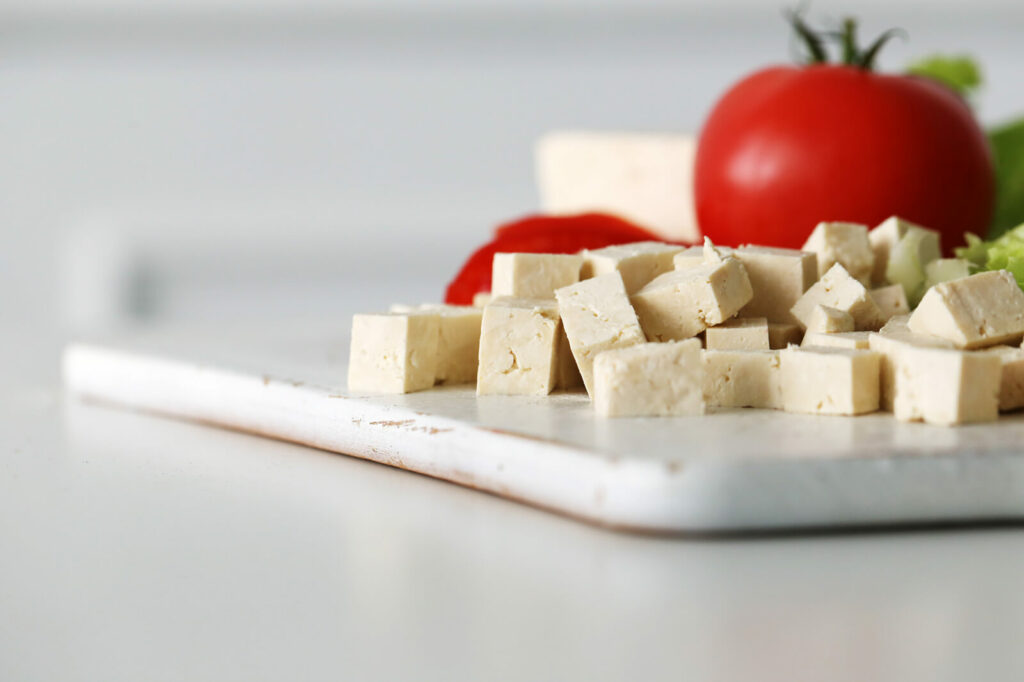
Explore Plant-Based Alternatives When Going Vegan
When transitioning to a vegan lifestyle, it’s important to include plant-based alternatives like tofu, tempeh, and seitan in your diet to ensure you’re getting enough protein. These plant-based options are versatile and can be used in a variety of dishes to meet your protein needs.
Nutritional yeast is a common vegan ingredient that adds a cheesy flavor to meals, and coconut milk, almond milk, and oat milk are popular dairy alternatives for vegan cooking. If you’re looking for a hearty breakfast option, consider using chickpea flour to make delicious vegan omelets.
Additionally, lentils, beans, and quinoa are excellent sources of plant-based protein that can easily be incorporated into your meals. Experimenting with these plant-based alternatives not only boosts the nutritional value of your diet but also adds exciting flavors and textures to your vegan dishes.
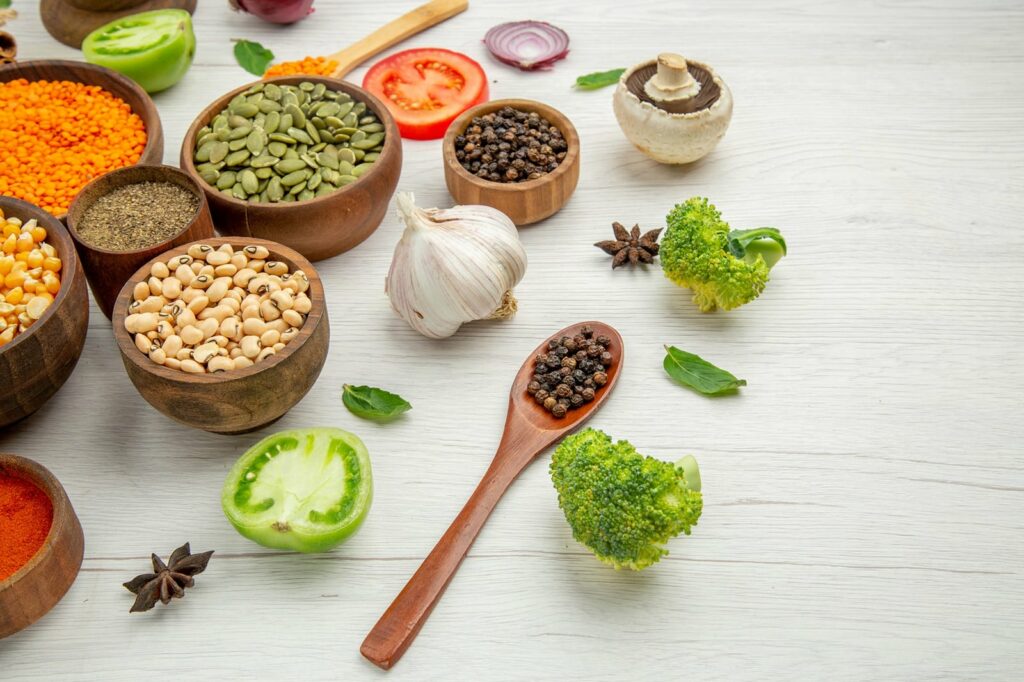
Learn Simple Recipes for a Vegan Diet
As a vegan dietitian, I recommend starting your vegan cooking journey by mastering a few simple yet flavorful recipes that suit your taste preferences and cooking skills. Begin with easy vegan dishes like chickpea curry, lentil soup, and quinoa stir-fry for quick and nourishing meals. Incorporate plant-based alternatives like tofu, tempeh, and seitan to replace meat in your favorite recipes.
Cashew cream is a versatile ingredient that can be used to create creamy sauces, nut cheeses, and dairy-free desserts in vegan cooking. Additionally, nutritional yeast is a great way to add a cheesy flavor and boost B vitamin intake in dishes like vegan macaroni and cheese or popcorn.
Explore online resources and vegan cookbooks to find a variety of simple and delicious recipes tailored to your preferences. These resources will help you create a diverse range of satisfying vegan meals that are both nutritious and delicious as you transition to a plant-based lifestyle.
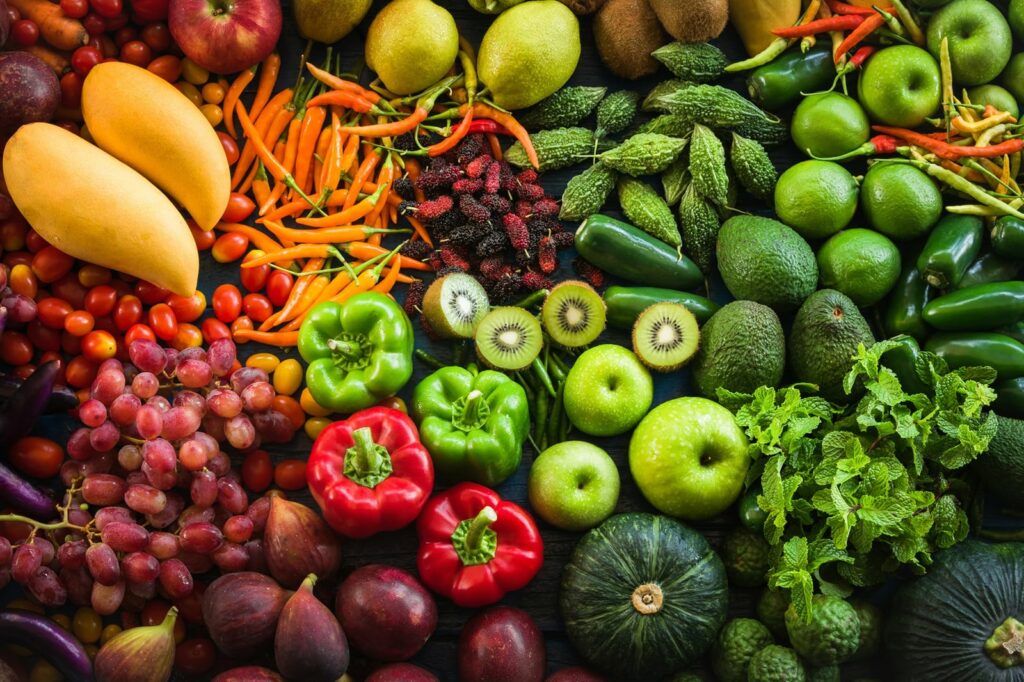
Eat More Whole Plant Foods on a Vegan Diet
When following a vegan diet for optimal health and wellness, it’s essential to focus on including a wide variety of whole plant foods that are rich in fiber, vitamins, minerals, and antioxidants. Here are some of the key components of a balanced vegan diet:
- Fruits
- Vegetables
- Legumes
- Grains
- Nuts
- Seeds
These all offer numerous health benefits. You can also take a look at the complete protein combinations for vegans. These foods support overall well-being, help reduce the risk of chronic diseases like heart disease, diabetes, and certain cancers, and are naturally cholesterol-free and low in saturated fat, which promotes heart health and aids in weight management.
By incorporating more whole plant foods into your meals, you can improve digestion, increase energy levels, and maintain a well-rounded vegan lifestyle. These foods also provide essential plant-based proteins and can be excellent dairy alternatives to ensure you meet your nutritional needs on a vegan diet. It’s important to include a variety of colorful fruits and vegetables in your daily meals to maximize the benefits of whole plant foods and ensure you’re getting a wide range of nutrients.
Incorporating whole plant foods into your diet can have a positive impact on your health and well-being. By focusing on these nutrient-dense foods, you can support your overall health, reduce the risk of chronic diseases, and enjoy a balanced and satisfying vegan diet. Remember to include a variety of whole plant foods in your meals to ensure you’re meeting your nutritional needs and reaping the benefits of a plant-based diet.

Supplement Your Vegan Diet If Needed
If you find it challenging to get all the essential nutrients from your vegan diet alone, supplementing can be beneficial to support your overall health. Vitamin B12 is particularly important for vegans since it’s not naturally present in plant-based foods.
Additionally, consider taking vitamin D supplements, especially if you don’t get much sun exposure. Omega-3 fatty acids are crucial for your well-being and can be obtained from algae-based supplements suitable for vegans.
Since plant-based iron isn’t as easily absorbed as iron from animal sources, you may need to consider iron supplements to meet your body’s needs. It’s always a good idea to consult with a healthcare professional or a registered dietitian to determine the specific supplements that may benefit you based on your individual health requirements.
Make a Vegan Diet Convenient
To make a vegan diet more convenient, it’s essential to keep a well-stocked pantry with key ingredients like grains, legumes, nuts, and seeds. These items serve as the foundation for easy and nutritious meal preparation.
Batch cooking and meal prepping are valuable techniques to ensure you have ready-to-eat vegan meals available throughout the week. By dedicating a bit of time to cooking in advance, you can save time and make healthier choices effortlessly.
Investing in reusable containers and meal prep tools can streamline the process of storing and transporting your meals. This not only makes your meals more portable but also helps in reducing waste, aligning with the values of a vegan lifestyle.
Take advantage of online grocery delivery services or curbside pickup options to conveniently stock up on vegan ingredients without the need to visit multiple stores. This can save you time and make it easier to maintain a well-rounded vegan diet.
Exploring vegan convenience foods such as pre-packaged salads, frozen meals, and plant-based snacks can be a lifesaver on busy days when time is short. These options provide quick and easy meal solutions without compromising on taste or nutrition.

Handle Social Situations When Going Vegan
Transitioning to a vegan lifestyle involves effectively managing social situations to uphold your dietary choices and promote understanding among friends and family. Communication plays a vital role in this process. Clearly express your dietary preferences when dining out and consider bringing a vegan dish to social gatherings to ensure you have options and introduce others to delicious plant-based meals.
Prior to making plans with friends, take the time to research vegan-friendly restaurants to ensure an enjoyable dining experience for everyone involved. Should questions or concerns about veganism arise, respond politely and confidently, offering insights and information to educate others. Maintain a positive and open-minded attitude during social interactions, emphasizing shared experiences over dietary differences.
Join a Vegan Community for Support
Joining a vegan community can provide valuable support, guidance, and motivation as you embrace a plant-based lifestyle. Being part of a vegan community offers a wealth of resources, tips, and advice to help you transition smoothly to a vegan diet. These communities not only provide practical guidance on meal planning and shopping but also emotional support to stay motivated.
Connecting with like-minded individuals in a vegan community can empower you with knowledge and make you feel more informed about your choices. Online vegan communities, in particular, offer easy access to a plethora of information, recipes, and discussions related to veganism. By participating in these groups, you can overcome challenges, share experiences, and receive encouragement to sustain your commitment to a vegan lifestyle.
Whether you seek recipe ideas, nutritional advice, or simply a sense of camaraderie, the vegan community is there to support you every step of the way.
Maintain a Vegan Diet Long-Term
To maintain a vegan diet long-term, it’s crucial to focus on consuming a wide variety of plant-based foods to ensure you meet your nutritional needs effectively. Incorporate an array of vegan foods such as fruits, vegetables, whole grains, legumes, nuts, and seeds into your daily meals. These plant-based options are rich in essential nutrients like protein, iron, calcium, vitamin B12, and omega-3 fatty acids that are vital for your overall health.
Adding diversity to your diet can be enjoyable and beneficial. You can explore alternatives like vegan cheeses and plant-based meat substitutes to enhance the variety in your meals while ensuring you obtain all the necessary nutrients. Making a commitment to a vegan lifestyle for the long haul can lead to improved health outcomes, but it’s important to stay informed about vegan nutrition guidelines.
Consulting with a registered dietitian can be immensely helpful in creating a well-balanced vegan meal plan tailored to your individual requirements. It’s also wise to be mindful of fortified foods and supplements to address any potential nutrient gaps and optimize your vegan diet for long-term sustainability. By taking these steps and staying informed, you can enjoy the many benefits of a well-rounded vegan lifestyle while supporting your health and well-being.

Enjoy the Health Benefits of a Vegan Diet
Discover the numerous health benefits of transitioning to a vegan diet and embracing a plant-based lifestyle packed with essential nutrients and vitality. By adopting a vegan diet, you can significantly reduce your risk of developing cardiovascular disease, certain types of cancer, and Type 2 diabetes. Studies have shown that individuals following a vegan diet often experience improvements in skin health, lower blood pressure, and overall well-being.
Additionally, the nutrient-dense nature of plant-based diets can lead to better sleep quality and enhanced brain function, contributing to overall health and vitality. Choosing a vegan lifestyle not only provides your body with essential nutrients, fiber, and antioxidants but also promotes ethical treatment of animals and environmental sustainability. This holistic approach to health not only nourishes your body but also aligns with your values and contributes to a more sustainable future.
Embracing the health advantages of a vegan lifestyle can have a positive impact on your well-being and the world around you. By incorporating a variety of plant-based foods into your diet, you can support your health and contribute to a more sustainable and compassionate world.
Remember Your Reasons for Going Vegan
As you reflect on why you chose to embrace a vegan lifestyle, remember that it goes beyond just what you eat. It’s a decision rooted in your values, aimed at reducing animal suffering and promoting compassion. By choosing a vegan diet, you also play a part in addressing environmental issues like deforestation, water pollution, and greenhouse gas emissions linked to animal agriculture.
In addition to these ethical and environmental considerations, a plant-based diet offers numerous health benefits. Research suggests that it can lower your risk of heart disease, diabetes, and certain types of cancer. These positive impacts on your health and the planet can be powerful motivators to stay committed to your vegan journey.
Staying connected with the vegan community can provide you with support, inspiration, and resources to help you along the way. Remember, your reasons for going vegan have the potential to create meaningful change in the world and lead you towards a more compassionate way of living.
Final Thoughts
Congratulations on starting your journey towards a vegan lifestyle! By beginning with a vegan challenge, slowly transitioning to a plant-based diet, and seeking support from the vegan community, you’re well on your way to experiencing the health benefits and tasty options that come with a vegan way of eating.
Remember why you chose to go vegan and continue exploring new plant-based alternatives to thrive on your path towards a more compassionate and sustainable lifestyle. Keep up the great work!
Show sources ⌄
Tuso PJ, Ismail MH, Ha BP, Bartolotto C. Nutritional update for physicians: plant-based diets. Perm J. 2013 Spring;17(2):61-6. doi: 10.7812/TPP/12-085. PMID: 23704846; PMCID: PMC3662288.
Salehin S, Rasmussen P, Mai S, Mushtaq M, Agarwal M, Hasan SM, Salehin S, Raja M, Gilani S, Khalife WI. Plant Based Diet and Its Effect on Cardiovascular Disease. Int J Environ Res Public Health. 2023 Feb 14;20(4):3337. doi: 10.3390/ijerph20043337. PMID: 36834032; PMCID: PMC9963093.
